大学英语4泛读翻译第十课
大学英语精读_第四册_Unit_10_The_Telephone

prefi x
root
resist
帮助 组成 存在 坚持,极力要求 坚持不懈,持续 抵制,抗议
• • • • • •
assist consist exist insist persist resist
prefi x
attain
root
• • • • • • • •
attain contain detain entertain maintain obtain pertain retain
Word Building--Compound
• n.+ n. butcher-shop chicken-pox finger-nail hail-storm pocket-knives trouble-shooter n.+ n. (ed) marble-sized n.+ v. (ed/ing) hand-rolled fish-bearing n.+ adj. jet-black adj.+ v. (ed) middle-aged full-blown
entertain
妓女, 娼妓
款待
troubleshooter
故障检修员;排解纠纷者
wring (wrung wrung) v. to clasp and twist or squeeze as in distress
devout(由devote衍生而来) adj. devoted to divine worship or service
a devout admirer devout thanks jet-black hair 漆黑的头发
Synonyms
pious fervent earnest
新概念英语第四册课文翻译及学习笔记:Lesson10

【课⽂】 First listen and then answer the following question. 听录⾳,然后回答以下问题。
What does the computer industry thrive on apart from anarchy? Technology trends may push Silicon Valley back to the future. Carver Mead, a pioneer in integrated circuits and a professor of computer science at the California Institute of Technology, notes there are now work-stations that enable engineers to design, test and produce chips right on their desks, much the way an editor creates a newsletter on a Macintosh. As the time and cost of making a chip drop to a few days and a few hundred dollars, engineers may soon be free to let their imaginations soar without being penalized by expensive failures. Mead predicts that inventors will be able to perfect powerful customized chips over a weekend at the office -- spawning a new generation of garage start-ups and giving the U.S. a jump on its foreign rivals in getting new products to market fast. 'We've got more garages with smart people,' Mead observes. 'We really thrive on anarchy.' And on Asians. Already, orientals and Asian Americans constitute the majority of the engineering staffs at many Valley firms. And Chinese, Korean, Filipino and Indian engineers are graduating in droves from California's colleges. As the heads of next-generation start-ups, these Asian innovators can draw on customs and languages to forge tighter links with crucial Pacific Rim markets. For instance, Alex Au, a Stanford Ph.D. from Hong Kong, has set up a Taiwan factory to challenge Japan's near lock on the memory-chip market. India-born N.Damodar Reddy's tiny California company reopened an AT & T chip plant in Kansas City last spring with financing from the state of Missouri. Before it becomes a retirement village, Silicon Valley may prove a classroom for building a global business. US NEWS AND WORLD REPORT, October 2, 1989 【New words and expressions ⽣词和短语】 silicon n. 硅 integrated adj. 综合的 circuit n. 线路,电路 California n. 加利福尼亚(美国州名) workstation n. ⼯作站 chip n. 芯⽚,集成电路⽚,集成块 newsletter n. 时事通讯 Macintosh n. 苹果机,⼀种个⼈电脑 penalize v. 处罚,惩罚 customize v. 按顾客具体需要制造 spawn v. 引起,酿成 thrive v. 兴旺,繁荣 anarchy n. ⽆政府状态,混乱 oriental n. 东⽅⼈ constitute v. 构成 drove n. 群 innovator n. 发明者 forge v. 发展 memory-chip n. 内存条 AT & T 美国电话电报公司 (American Telephone and Telegraph) Kansas n. 堪萨斯(美国州名) Missouri n. 密苏⾥(美国州名) 【课⽂注释】 1. thrive on靠……健壮发展,以……旺盛。
新视野大学英语读写教程第四册10课答案及课文翻译分析解析
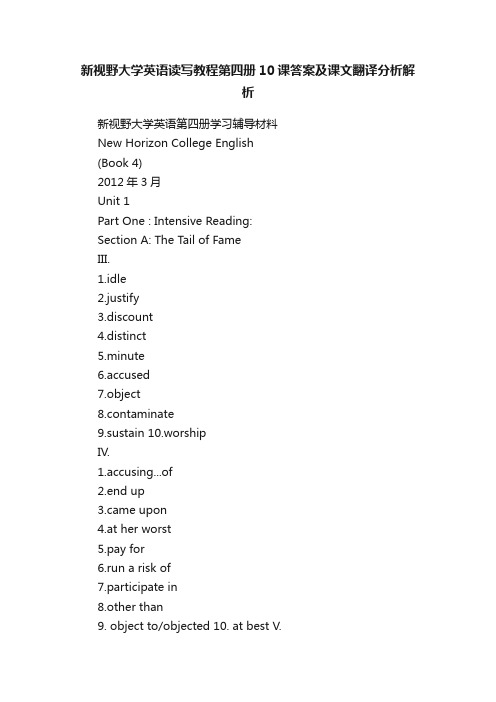
新视野大学英语读写教程第四册10课答案及课文翻译分析解析新视野大学英语第四册学习辅导材料New Horizon College English(Book 4)2012年3月Unit 1Part One : Intensive Reading:Section A: The Tail of FameIII.1.idle2.justify3.discount4.distinct5.minute6.accused7.object8.contaminate9.sustain 10.worshipIV.1.accusing...of2.end up3.came upon4.at her worst5.pay for6.run a risk of7.participate in8.other than9. object to/objected 10. at best V.1.K2.G3.C4.E5.N6.O7.I8. L9.A 10. D VI.1.delay2.pain3.hardship4.suffering5.fever6.defeat7.poverty8.treatment9.noise 10.agony VII.1.justify2.glorify3.exemplifies4.classified5.purified6.intensify7.identify8.terrified VIII.1.bravery2.jewelry3.delivery4.machinery5.robbery 6 nursery 7.scenery 8.discoveryIX.1. other than for funerals and weddings2. other than to live an independent life3. other than that they appealed to his eye4. but other than that, he'll eat just about everything5. other than that it's somewhere in the town center.X.1. shouldn't have been to the cinema last night2. would have; told him the answer3. they needn't have gone at all4. must have had too much work to do5. might have been injured seriouslyXI.1. The plant does not grow well in soils other than the one in which it has been developed.2. Research findings show that we spend about two hours dreaming every night, no matter whatwe may have done during the day.3. Some people tend to justify their failure by blaming others for not trying their best.4. We remain true to our commitment: Whatever we promised to do; we would do it.5. Even Beethoven's father discounted the possibility that his son would one day become the greatest musician in the world. The same is true of Edison, who seemed to his teacher to be quite dull.6. They were accused by authorities of threatening the statesecurity.Ⅻ.l.出入除自己家以外的任何场所时,如果你带有宠物,一定要了解有关宠物的规定。
新概念英语第四册自学导读:第十课硅谷(上)

Lesson 10 Silicon valley第⼗课硅⾕from US NEWS AND WORLD REPORT, October 2,198910-1. Technology trends may push Silicon Valley back to the future.【译⽂】技术的发展趋势有可能把硅⾕重新推向未来。
10-2. Carver Mead, a pioneer in integrated circuits and a professor of computer science at the California Institute of Technology, notes there are now work-stations that enable engineers to design, test and produce chips right on their desks, much the way an editor creates a newsletter on a Macintosh.【译⽂】集成电路先驱、加州理⼯学院计算机教授卡弗•⽶德注意到,现在有些计算机⼯作站使⼯程技术⼈员可以在他们的办公桌上设计、试验和⽣产芯⽚,如某编辑在苹果机上编出时事通讯⼀样。
【讲解】a pioneer in integrated circuits和a professor of…Technology并列作Carver Mead的同位语。
enable engineers to …desks为定语从句,修饰work-stations。
much the way an editor creates a newsletter on a Macintosh中the way前省略了介词in,整个短语在句中作⽅式状语。
在⾮正式⽂体中,in the way中的介词in 通常被省略,例如:You’re doing it (in)the wrong way.你做这件事的⽅法不对。
英语泛读教程4__课文翻译
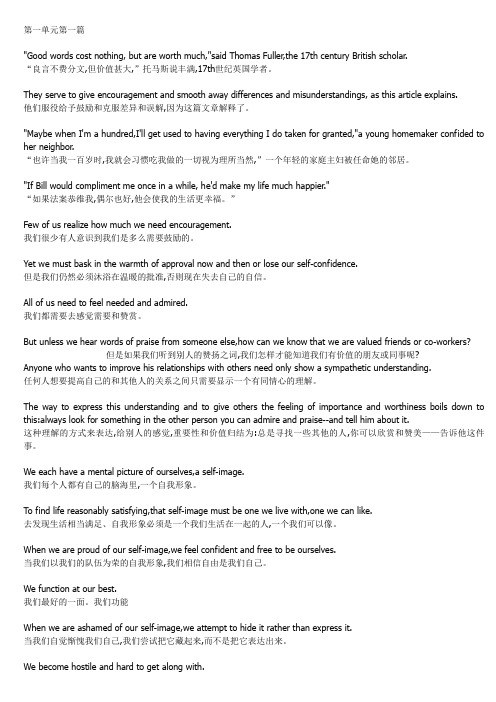
第一单元第一篇"Good words cost nothing, but are worth much,"said Thomas Fuller,the 17th century British scholar.“良言不费分文,但价值甚大,”托马斯说丰满,17th世纪英国学者。
They serve to give encouragement and smooth away differences and misunderstandings, as this article explains.他们服役给予鼓励和克服差异和误解,因为这篇文章解释了。
"Maybe when I'm a hundred,I'll get used to having everything I do taken for granted,"a young homemaker confided to her neighbor.“也许当我一百岁时,我就会习惯吃我做的一切视为理所当然,”一个年轻的家庭主妇被任命她的邻居。
"If Bill would compliment me once in a while, he'd make my life much happier."“如果法案恭维我,偶尔也好,他会使我的生活更幸福。
”Few of us realize how much we need encouragement.我们很少有人意识到我们是多么需要鼓励的。
Yet we must bask in the warmth of approval now and then or lose our self-confidence.但是我们仍然必须沐浴在温暖的批准,否则现在失去自己的自信。
All of us need to feel needed and admired.我们都需要去感觉需要和赞赏。
大学英语泛读教程第四册全文翻译
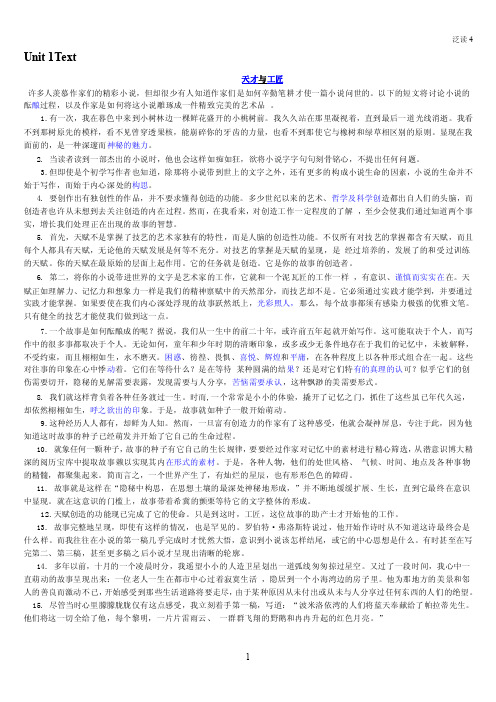
Unit 1Text天才与工匠许多人羡慕作家们的精彩小说,但却很少有人知道作家们是如何辛勤笔耕才使一篇小说问世的。
以下的短文将讨论小说的酝酿过程,以及作家是如何将这小说雕琢成一件精致完美的艺术品。
1.有一次,我在暮色中来到小树林边一棵鲜花盛开的小桃树前。
我久久站在那里凝视着,直到最后一道光线消逝。
我看不到那树原先的模样,看不见曾穿透果核,能崩碎你的牙齿的力量,也看不到那使它与橡树和绿草相区别的原则。
显现在我面前的,是一种深邃而神秘的魅力。
2. 当读者读到一部杰出的小说时,他也会这样如痴如狂,欲将小说字字句句刻骨铭心,不提出任何问题。
3.但即使是个初学写作者也知道,除那将小说带到世上的文字之外,还有更多的构成小说生命的因素,小说的生命并不始于写作,而始于内心深处的构思。
4. 要创作出有独创性的作品,并不要求懂得创造的功能。
多少世纪以来的艺术、哲学及科学创造都出自人们的头脑,而创造者也许从未想到去关注创造的内在过程。
然而,在我看来,对创造工作一定程度的了解,至少会使我们通过知道两个事实,增长我们处理正在出现的故事的智慧。
5. 首先,天赋不是掌握了技艺的艺术家独有的特性,而是人脑的创造性功能。
不仅所有对技艺的掌握都含有天赋,而且每个人都具有天赋,无论他的天赋发展是何等不充分。
对技艺的掌握是天赋的显现,是经过培养的,发展了的和受过训练的天赋。
你的天赋在最原始的层面上起作用。
它的任务就是创造。
它是你的故事的创造者。
6. 第二,将你的小说带进世界的文字是艺术家的工作,它就和一个泥瓦匠的工作一样,有意识、谨慎而实实在在。
天赋正如理解力、记忆力和想象力一样是我们的精神禀赋中的天然部分,而技艺却不是。
它必须通过实践才能学到,并要通过实践才能掌握。
如果要使在我们内心深处浮现的故事跃然纸上,光彩照人,那么,每个故事都须有感染力极强的优雅文笔。
英语专业泛读教程第四册课文翻译UNIT1-UNIT10

英语专业泛读教程第四册课文翻译UNIT1-UNIT10英语专业泛读教程第四册课文翻译(unit1-10)一、天才与工匠许多人羡慕作家们的精彩小说,但却很少有人知道作家们是如何辛勤笔耕才使一篇小说问世的。
以下的短文将讨论小说的酝酿过程,以及作家是如何将这小说雕琢成一件精致完美的艺术品。
有一次,我在暮色中来到小树林边一棵鲜花盛开的小桃树前。
我久久站在那里凝视着,直到最后一道光线消逝。
我看不到那树原先的模样,看不见曾穿透果核,能崩碎你的牙齿的力量,也看不到那使它与橡树和绿草相区别的原则。
显现在我面前的,是一种深邃而神秘的魅力。
当读者读到一部杰出的小说时,他也会这样如痴如狂,欲将小说字字句句刻骨铭心,不提出任何问题。
但即使是个初学写作者也知道,除那将小说带到世上的文字之外,还有更多的构成小说生命的因素,小说的生命并不始于写作,而始于内心深处的构思。
要创作出有独创性的作品,并不要求懂得创造的功能。
多少世纪以来的艺术、哲学及科学创造都出自人们的头脑,而创造者也许从未想到去关注创造的内在过程。
然而,在我看来,对创造工作一定程度的了解,至少会使我们通过知道两个事实,增长我们处理正在出现的故事的智慧。
首先,天赋不是掌握了技艺的艺术家独有的特性,而是人脑的创造性功能。
不仅所有对技艺的掌握都含有天赋,而且每个人都具有天赋,无论他的天赋发展是何等不充分。
对技艺的掌握是天赋的显现,是经过培养的,发展了的和受过训练的天赋。
你的天赋在最原始的层面上起作用。
它的任务就是创造。
它是你的故事的创造者。
第二,将你的小说带进世界的文字是艺术家的工作,它就和一个泥瓦匠的工作一样,有意识、谨慎而实实在在。
天赋正如理解力、记忆力和想象力一样是我们的精神禀赋中的天然部分,而技艺却不是。
它必须通过实践才能学到,并要通过实践才能掌握。
如果要使在我们内心深处浮现的故事跃然纸上,光彩照人,那么,每个故事都须有感染力极强的优雅文笔。
只有健全的技艺才能使我们做到这一点。
大学英语4翻译、cloze、泛读

Unit 3Sentence translation1.食物供应还不足以应付饥民的需求。
(inadequate)1. The food supplies are inadequate to meet the needs of the hungry.2. 只要我们竭尽全力做到最好,我们就能掌握未来。
(endeavor, in our hands)2. As long as we endeavor to do our best, we can have the future in our hands.3我要事先告诉你,录用者需要经常出差去寻找我们的潜在客户。
(beforehand,prospective) 3. I should tell you beforehand that successful applicants will be expected to travel extensively to find our prospective customers.4. 父亲反复追问小男孩为什么把钉子钉进那么昂贵的画中。
(grill, hammer)4. The little boy was grilled by his father why he hammered the nail into that expensive painting.5. 俗话说,选择比努力更重要。
在我看来,凡事事先做好准备,那么成功就是可以预见的。
(as I see it, do one’s homework)5. As the saying goes, the choice is more important than efforts. As I see it, always to do my homework, then success is predictable.参考译文Passage translation常言道,好的开端是成功的一半。
大学英语4泛读翻译第十课
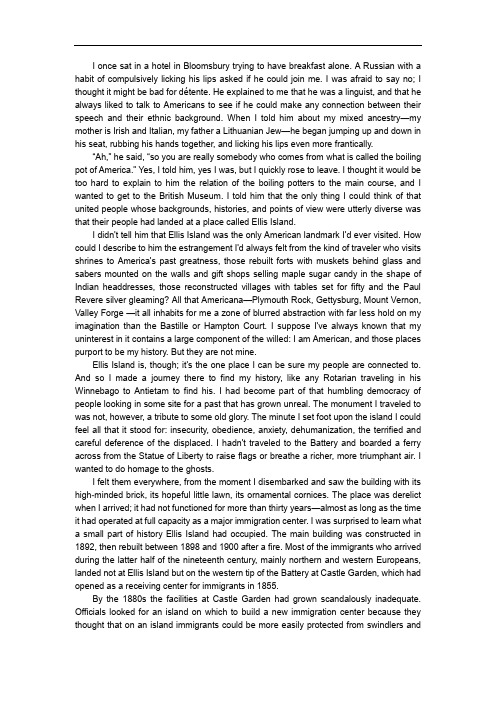
I once sat in a hotel in Bloomsbury trying to have breakfast alone. A Russian with a habit of compulsively licking his lips asked if he could join me. I was afraid to say no; I thought it might be bad for détente. He explained to me that he was a linguist, and that he always liked to talk to Americans to see if he could make any connection between their speech and their ethnic background. When I told him about my mixed ancestry—my mother is Irish and Italian, my father a Lithuanian Jew—he began jumping up and down in his seat, rubbing his hands together, and licking his lips even more frantically.“Ah,” he said, “so you are really somebody who comes from what is called the boiling pot of America.” Yes, I told him, yes I was, but I quickly rose to leave. I thought it would be too hard to explain to him the relation of the boiling potters to the main course, and I wanted to get to the British Museum. I told him that the only thing I could think of that united people whose backgrounds, histories, and points of view were utterly diverse was that their people had landed at a place called Ellis Island.I didn't tell him that Ellis Island was the only American landmark I'd ever visited. How could I describe to him the estrangement I'd always felt from the kind of traveler who visits shrines to America's past greatness, those rebuilt forts with muskets behind glass and sabers mounted on the walls and gift shops selling maple sugar candy in the shape of Indian headdresses, those reconstructed villages with tables set for fifty and the Paul Revere silver gleaming?All that Americana—Plymouth Rock, Gettysburg, Mount Vernon, Valley Forge —it all inhabits for me a zone of blurred abstraction with far less hold on my imagination than the Bastille or Hampton Court. I suppose I've always known that my uninterest in it contains a large component of the willed: I am American, and those places purport to be my history. But they are not mine.Ellis Island is, though; it's the one place I can be sure my people are connected to. And so I made a journey there to find my history, like any Rotarian traveling in his Winnebago to Antietam to find his. I had become part of that humbling democracy of people looking in some site for a past that has grown unreal. The monument I traveled to was not, however, a tribute to some old glory. The minute I set foot upon the island I could feel all that it stood for: insecurity, obedience, anxiety, dehumanization, the terrified and careful deferenceof the displaced. I hadn't traveled to the Battery and boarded a ferry across from the Statue of Liberty to raise flags or breathe a richer, more triumphant air. I wanted to do homage to the ghosts.I felt them everywhere, from the moment I disembarked and saw the building with its high-minded brick, its hopeful little lawn, its ornamental cornices. The place was derelict when I arrived; it had not functioned for more than thirty years—almost as long as the time it had operated at full capacity as a major immigration center. I was surprised to learn what a small part of history Ellis Island had occupied. The main building was constructed in 1892, then rebuilt between 1898 and 1900 after a fire. Most of the immigrants who arrived during the latter half of the nineteenth century, mainly northern and western Europeans, landed not at Ellis Island but on the western tip of the Battery at Castle Garden, which had opened as a receiving center for immigrants in 1855.By the 1880s the facilities at Castle Garden had grown scandalously inadequate. Officials looked for an island on which to build a new immigration center because they thought that on an island immigrants could be more easily protected from swindlers andquickly transported to railroad terminals in New Jersey. Bedloe's Island was considered, but New Yorkers were aghast at the idea of a “Babel” ruining their beautiful new treasure, “Liberty Enlightening the World.” The statue's sculptor, Frederic Auguste Bartholdi, reacted to the prospect of immigrants landing near his masterpiece in horror; he called it a “monstrous plan.”So much for Emma Lazarus.Ellis Island was finally chosen because the citizens of New Jersey petitioned the federal government to remove from the island an old naval powder magazine that they thought dangerously close to the Jersey shore. The explosives were removed; no one wanted the island for anything. It was the perfect place to build an immigration center.I thought about the island's history as I walked into the building and made my way to the room that was the center in my imagination of the Ellis Island experience: the Great Hall. It had been made real for me in the stark, accusing photographs of Louis Hine and others who took those pictures to make a point. It was in the Great Hall that everyone had waited—waiting, always, the great vocation of the dispossessed. The room was empty, except for me and a handful of other visitors and the park ranger who showed us around. I felt myself grow insignificant in that room, with its huge semicircular windows, its air, even in dereliction, of solid and official probity.I walked in the deathlike expansiveness of the room's disuse and tried to think of what it might have been like, filled and swarming. More than sixteen million immigrants came through that room; approximately 250,000 were rejected. Not really a large proportion, but the implications for the rejected were dreadful. For some, there was nothing to go back to, or there was certain death; for others, who left as adventurers, to return would be to adopt in local memory the fool's role and the failure's. No wonder that the island's history includes reports of three thousand suicides.Sometimes immigrants could pass through Ellis Island in mere hours, though for some the process took days. The particulars of the experience in the Great Hall were often influenced by the political events and attitudes on the mainland. In the 1890s and the first years of the new century, when cheap labor was needed, the newly built receiving center took in its immigrants with comparatively little question. But as the century progressed, the economy worsened, eugenics became both scientifically respectable and popular, and World War I made American xenophobia seem rooted in fact.Immigration acts were passed; newcomers had to prove, besides moral correctness and financial solvency, their ability to read. Quota laws came into effect, limiting the number of immigrants from southern and eastern Europe to less than 14 percent of the total quota. Intelligence tests were biased against all non-English-speaking persons and medical examinations became increasingly strict, until the machinery of immigration nearly collapsed under its own weight. The Second Quota Law of 1924 provided that all immigrants be inspected and issued visas at American consular offices in Europe, rendering the center almost obsolete.On the day of my visit, my mind fastened upon the medical inspections, which had always seemed to me most emblematic of the ignominy and terror the immigrants endured. The medical inspectors, sometimes dressed in uniforms like soldiers, were particularly obsessed with a disease of the eyes called trachoma, which they checked for by flipping back the immigrants' top eyelids with a hook used for buttoning gloves—amethod that sometimes resulted in the transmission of the disease to healthy people. Mothers feared that if their children cried too much, their red eyes would be mistaken for a symptom of the disease and the whole family would be sent home. Those immigrants suspected of some physical disability had initials chalked on their coats. I remembered the photographs I'd seen of people standing, dumbstruck and innocent as cattle, with their manifest numbers hung around their necks and initials marked in chalk upon their coats: “E” for eye trouble, “K” for hernia, “L” for lameness, “X” for mental defects, “H” for heart disease.I thought of my grandparents as I stood in the room; my seventeen-year-old grandmother, coming alone from Ireland in 1896, vouched for by a stranger who had found her a place as a domestic servant to some Irish who had done well. I tried to imagine the assault it all must have been for her; I've been to her hometown, a collection of farms with a main street—smaller than the athletic field of my local public school. She must have watched the New York skyline as the first- and second-class passengers were whisked off the gangplank with the most cursory of inspections while she was made to board a ferry to the new immigration center.What could she have made of it—this buff-painted wooden structure with its towers and its blue slate roof, a place Harper's Weekly described as “a latter-day watering place hotel”? It would have been the first time she'd have heard people speaking some thing other than English. She would have mingled with people carrying baskets on their heads and eating foods unlike any she had ever seen—dark-eyed people, like the Sicilian she would marry ten years later, who came over with his family, responsible even then for his mother and sister. I don't know what they thought, my grandparents, for they were not expansive people, nor romantic; they didn't like to think of what they called “the hard times,” and their trip across the ocean was the single adventurous ac t of lives devoted after landing to security, respectability, and fitting in.What is the potency of Ellis Island for someone like me—an American, obviously, but one who has always felt that the country really belonged to the early settlers, that, as J. F. Powers wrote in “MorteD'Urban,” it had been “handed down to them by the Pilgrims, George Washington and others, and that they were taking a risk in letting you live in it.” I have never been the victim of overt discrimination; nothing I have wanted has be en denied me because of the accidents of blood. But I suppose it is part of being an American to be engaged in a somewhat tiresome but always self-absorbingprocess of national definition. And in this process, I have found in traveling to Ellis Island an important piece of evidence that could remind me I was right to feel my differentness. Something had happened to my people on that island, a result of the eternal wrongheadedness of American protectionism and the predictabilities of simple greed. I came to the island, too, so I could tell the ghosts that I was one of them, and that I honored them—their stoicism, and their innocence, the fear that turned them inward, and their pride. I wanted to tell them that I liked them better than the Americans who made them pass through the Great Hall and stole their names and chalked their weaknesses in public on their clothing. And to tell the ghosts what I have always thought: that American history was a very classy party that was not much fun until they arrived, brought the good food, turned up the music, and taught everyone to dance.一次我一个人坐在Bloomsbury的一家旅馆里吃早餐时,一个有着强制性舔嘴唇习惯的俄国人问是否能和我一起吃。
新概念第四册课文翻译及学习笔记:Lesson10
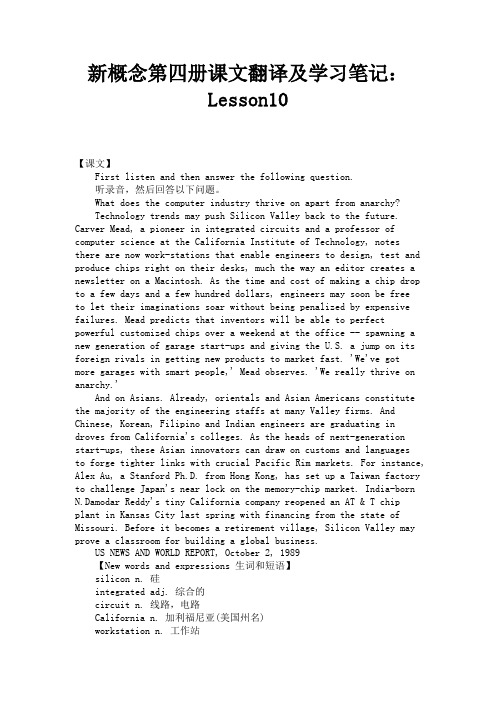
新概念第四册课文翻译及学习笔记:Lesson10【课文】First listen and then answer the following question.听录音,然后回答以下问题。
What does the computer industry thrive on apart from anarchy?Technology trends may push Silicon Valley back to the future. Carver Mead, a pioneer in integrated circuits and a professor of computer science at the California Institute of Technology, notes there are now work-stations that enable engineers to design, test and produce chips right on their desks, much the way an editor creates a newsletter on a Macintosh. As the time and cost of making a chip drop to a few days and a few hundred dollars, engineers may soon be freeto let their imaginations soar without being penalized by expensive failures. Mead predicts that inventors will be able to perfect powerful customized chips over a weekend at the office -- spawning a new generation of garage start-ups and giving the U.S. a jump on its foreign rivals in getting new products to market fast. 'We've got more garages with smart people,' Mead observes. 'We really thrive on anarchy.'And on Asians. Already, orientals and Asian Americans constitute the majority of the engineering staffs at many Valley firms. And Chinese, Korean, Filipino and Indian engineers are graduating in droves from California's colleges. As the heads of next-generation start-ups, these Asian innovators can draw on customs and languagesto forge tighter links with crucial Pacific Rim markets. For instance, Alex Au, a Stanford Ph.D. from Hong Kong, has set up a Taiwan factory to challenge Japan's near lock on the memory-chip market. India-born N.Damodar Reddy's tiny California company reopened an AT & T chipplant in Kansas City last spring with financing from the state of Missouri. Before it becomes a retirement village, Silicon Valley may prove a classroom for building a global business.US NEWS AND WORLD REPORT, October 2, 1989【New words and expressions 生词和短语】silicon n. 硅integrated adj. 综合的circuit n. 线路,电路California n. 加利福尼亚(美国州名)workstation n. 工作站chip n. 芯片,集成电路片,集成块newsletter n. 时事通讯Macintosh n. 苹果机,一种个人电脑penalize v. 处罚,惩罚customize v. 按顾客具体需要制造spawn v. 引起,酿成thrive v. 兴旺,繁荣anarchy n. 无政府状态,混乱oriental n. 东方人constitute v. 构成drove n. 群innovator n. 发明者forge v. 发展memory-chip n. 内存条AT & T 美国电话电报公司 (American Telephone and Telegraph)Kansas n. 堪萨斯(美国州名)Missouri n. 密苏里(美国州名)【课文注释】1. thrive on靠……健壮发展,以……旺盛。
新视野大学英语4 UNIT10课文翻译及答案
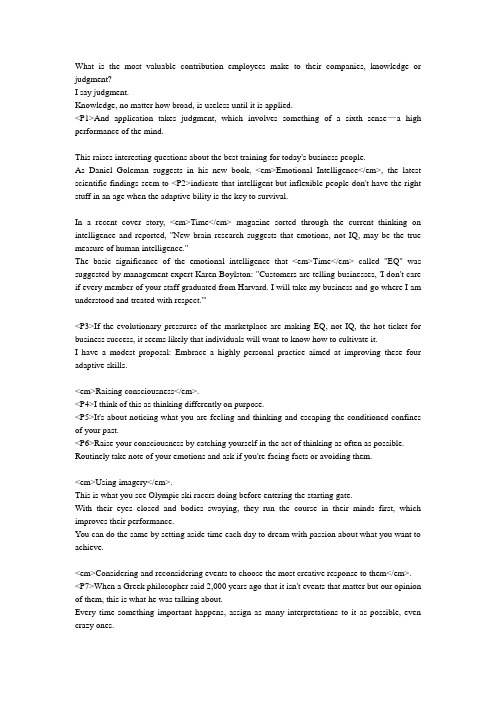
What is the most valuable contribution employees make to their companies, knowledge or judgment?I say judgment.Knowledge, no matter how broad, is useless until it is applied.<P1>And application takes judgment, which involves something of a sixth sense—a high performance of the mind.This raises interesting questions about the best training for today's business people.As Daniel Goleman suggests in his new book, <em>Emotional Intelligence</em>, the latest scientific findings seem to <P2>indicate that intelligent but inflexible people don't have the right stuff in an age when the adaptive bility is the key to survival.In a recent cover story, <em>Time</em> magazine sorted through the current thinking on intelligence and reported, "New brain research suggests that emotions, not IQ, may be the true measure of human intelligence."The basic significance of the emotional intelligence that <em>Time</em> called "EQ" was suggested by management expert Karen Boylston: "Customers are telling businesses, 'I don't care if every member of your staff graduated from Harvard. I will take my business and go where I am understood and treated with respect.'"<P3>If the evolutionary pressures of the marketplace are making EQ, not IQ, the hot ticket for business success, it seems likely that individuals will want to know how to cultivate it.I have a modest proposal: Embrace a highly personal practice aimed at improving these four adaptive skills.<em>Raising consciousness</em>.<P4>I think of this as thinking differently on purpose.<P5>It's about noticing what you are feeling and thinking and escaping the conditioned confines of your past.<P6>Raise your consciousness by catching yourself in the act of thinking as often as possible. Routinely take note of your emotions and ask if you're facing facts or avoiding them.<em>Using imagery</em>.This is what you see Olympic ski racers doing before entering the starting gate.With their eyes closed and bodies swaying, they run the course in their minds first, which improves their performance.You can do the same by setting aside time each day to dream with passion about what you want to achieve.<em>Considering and reconsidering events to choose the most creative response to them</em>. <P7>When a Greek philosopher said 2,000 years ago that it isn't events that matter but our opinion of them, this is what he was talking about.Every time something important happens, assign as many interpretations to it as possible, even crazy ones.Then go with the interpretation most supportive of your dreams.<em>Integrating the perspectives of others</em>.Brain research shows that our view of the world is limited by our genes and the experiences we've had.<P8>Learning to <1>incorporate</1> the useful perspectives of others is nothing less than a form of enlarging your senses.The next time someone interprets something differently from you—say, a controversial political event—pause to reflect on the role of life experience and consider it a gift of perception.<P9>The force of habit—literally the established wiring of your brain—will pull you away from practicing these skills.Keep at it, however, because they are based on what we're learning about the mechanism of the mind.Within the first six months of life the human brain doubles in capacity.It doubles again by age four and then grows rapidly until we reach sexual maturity.The body has about a hundred billion nerve cells, and every experience <2>triggers</2> a brain response that literally shapes our senses.The mind, we now know, is not confined to the brain but is distributed throughout the body's universe of cells.Yes, we do think with our hearts, brains, muscles, blood and bones.During a single crucial three-week period during our teenage years, chemical activity in the brain is cut in half.<P10>That done, we are "biologically wired" with what one of the nation's leading brain researchers calls our own "world view".He says it is impossible for any two people to see the world exactly alike.So unique is the personal experience that people would understand the world differently.However, it is not only possible to change your world view, he says, it's actually easier than overcoming a drug habit.<P11>But you need a discipline for doing it.Hence, the method recommended here.<P12>No, it's not a curriculum in the sense that an MBA is.But the latest research seems to imply that without the software of emotional maturity and self-knowledge, the hardware of academic training alone is worth less and less.员工对公司最有价值的贡献是什么,是知识还是判断力?我说是判断力。
英语泛读教程 4 Unit 10 Christianity

Part 4. (P13)
The influence of the reformation.
25
WORD PRETEST
26
1.She was a devout Catholic.
A. devoted B. enthusiastic C. pious
answer: C
27
她是个虔诚的天主教徒。
dual purpose of sex; consistent ethic of life; human relationships; central role of family
3) Social Ethics:
dignity of each person; common good; care of the poor/needy; work, participation, property
•Protestantism:
•Martin Luther the “father” of Protestantism. Clergy are permitted to
6
•Eastern Orthodoxy:
•Eastern Orthodoxy denies the authority of the Roman Catholic Pope to speak and act f or the enti re chu r ch b y himself without a church council. Parish priests are expected to be married, but bishops a re chosen from among monks, and are
Ulrich Zwingli
Leaders
新概念英语4第十课讲解
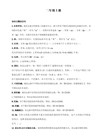
Twelve months constitute a year. 12个月为1年。
10-8. And Chinese, Korean, Filipino and Indian engineers are graduating in droves from California's colleges.
【译文】中国、韩国、菲律宾和印度的工程师一批批地从加州的各所大学毕业。
【单词和短语】
droves:(走在一起的)人群,(crowds of people),例如:
On a hot, muggy day people head for the beaches in droves.
在闷热天人们成群地去海滩。
I don’t like the way (that)you talk to me.
我可不喜欢你同我谈话的方式。
Let’s go the way(that)we went yesterday.
让我们走我们昨天走的那条路吧。
10-3. As the time and cost of making a chip drop to a few days and a few hundred dollars, engineers may soon be free to let their imaginations soar without being penalized by expensive failures.
Such a systempenalized the poor. 这种制度妨碍了穷人的利益。
全新版大学英语综合教程第四册课文翻译及习题答案(上海外语教育出版
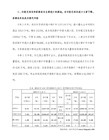
Chinese Translations of Texts A(Units 1-8)参考译文第一单元与自然力量抗争课文A????人道是骄兵必败。
就拿拿破仑和希特勒两人来说吧,他们所向披靡,便以为自己战无不胜,不可阻挡。
但俄罗斯的冰雪卫士证明他们错了。
冰雪卫士奈拉·B·斯密斯????1812年,法国皇帝拿破仑·波拿巴率大军入侵俄罗斯。
他准备好俄罗斯人民会为保卫祖国而奋勇抵抗。
他准备好在俄罗斯广袤的国土上要经过长途跋涉才能进军首都莫斯科。
但他没有料到在莫斯科他会遭遇劲敌——俄罗斯阴冷凄苦的寒冬。
1941年,纳粹德国元首阿道夫·希特勒进攻当时被称作苏联的俄罗斯。
希特勒的军事实力堪称无敌。
他的战争机器扫除了欧洲绝大部分地区的抵抗。
希特勒希望速战速决,但是,就像在他之前的拿破仑一样,他得到的是痛苦的教训。
仍是俄罗斯的冬天助了苏维埃士兵一臂之力。
拿破仑发起的战役????1812年春,拿破仑在俄国边境屯兵60万。
这些士兵受过良好训练,作战力强,装备精良。
这支军队被称为大军。
拿破仑对马到成功充满自信,预言要在5个星期内攻下俄国。
????不久,拿破仑的大军渡过涅曼河进入俄国。
拿破仑期盼着的速决速胜迟迟没有发生。
令他吃惊的是,俄国人并不奋起抵抗。
相反,他们一路东撤,沿途焚毁庄稼和民居。
大军紧追不舍,但它的长驱直入很快由于粮草运输缓慢而停顿下来。
????到了8月,法俄两军在斯摩棱斯克交战,这一战役中,双方各有上万人阵亡。
可是,俄国人仍能在自己的国土上继续后撒。
拿破仑未能取得决定性的胜利。
此刻他面临着一个重要抉择。
是继续追击俄国,军队,还是把军队驻扎在斯摩棱斯克,在那儿度过将到的冬天? ????拿破仑孤注一掷,决定向远在448公里之外的莫斯科进发。
1812年9月7日,法俄两军在莫斯科以西112公里外的鲍罗季诺激战。
夜幕降临时,3万名法国士兵以及4万4千名俄国士兵或伤或亡,倒在了战场上。
大学英语第四册第10课
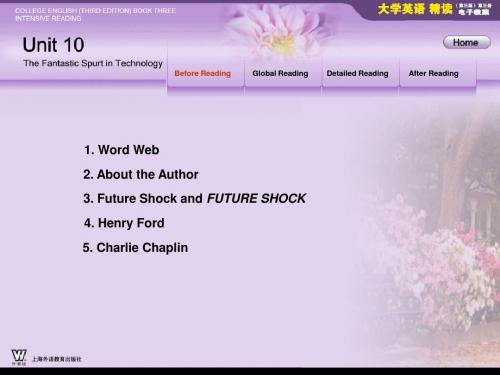
being born in New York in 1928 graduating from New York University in 1949
1. 2. 3. 4.
a former Associate Editor of Fortune magazine a visiting scholar at the Russell Sage Foundation a visiting professor at Cornell University a professor teaching one of the first courses devoted entirely to the future at the New School for Social Research in 1966 5. the editor of The Futurists and Learning for Tomorrow
June 16, 1903
Founding the Ford Motor Company in Detroit Introducing the assembly line method of manufacturing autos
October 7, 1913
Before Reading
Global Reading
1879
Obtaining his first job, as an apprentice machinist Marrying Clara Bryant of Greenfield Township and moving to the 80-acre farm in what is today Dearborn
Before Reading
Global Reading
英语泛读教程unit10课文翻译

改革1.文艺复兴带到了欧洲精神和思想在中世纪完全不同于的一种方式。
另一种与中世纪的突破之际,改革者质疑教会,其政治影响力已经减弱,在中世纪晚期的权威。
到了14世纪,教会内的改革正在要求在欧洲的许多国家。
2.不满教会是特别强在神圣罗马帝国的德国各州。
虔诚的德国人声讨让主教买他们的立场的做法。
许多德国人憎恨神职人员的一些成员的世俗,缺乏虔诚,和贪婪。
3.谁成为对教会的抗议活动的领导者是德国和尚的人,马丁·路德(1483-15460)。
路德教会圣经研究在维滕贝格的大学。
他带领一个严格和虔诚的生活,但感到不安的罪恶的感觉,担心他将永远不会进入天国。
激烈的心理斗争之后,路德开始相信男人和女人只能由上帝的恩典,这将在基督里给予他们的信仰被保存。
他认为,虽然一个真正的基督徒将执行好作品,这些并没有带来拯救。
基督徒,路德认为,通过恩典和信心得到了救赎。
4.路德的信仰使他直接冲突与教会了人们如何能得到赦免的罪的问题。
教会教导说,大多数罪将被原谅,如果一个人供认了一名牧师,后悔的行动,并求上帝宽恕,并没有忏悔,如空腹或祈祷。
还是被赦免的罪另一种方式,不过,是要给予放纵。
一种放纵,有人认为,减少了一个人的灵魂将不得不花费在痛苦或惩罚之前灵魂达到天堂的时间。
路德的时代,宽容可以以换取教会货币的贡献来获得。
有些神职人员出售宽容主要是筹集资金,为教会或主教的一种方式。
5.宽容的销售受到广泛批评,并在1517年10月31日,路德质疑这种做法公开。
在上一维滕贝格教堂的门,他钉95这些,或参数,攻击出售赎罪券,并邀请辩论。
路德的挑战,新的迅速蔓延。
尽管教会反对官员路德,很多人同意他的想法,他开始质疑其他教会的教学。
像早期的改革者,路德说,圣经提供的所有的人需要住一个基督徒生活的指导。
路德认为人们应该阅读圣经,找到路径的信心。
他没有想到,他们不得不依靠由教皇或神职人员给出的解释。
他敦促改变教会服务,并说,神职人员成员应该被允许结婚。
新概念英语第四册自学导读:第十课硅谷(下)

10-7. Already, orientals and Asian Americans constitute the majority of the engineering staffs at many Valley firms.【译⽂】硅⾕许多公司的⼯程技术⼈员⼤多是东⽅⼈和亚裔美国⼈。
【单词和短语】constitute:组成,构成,形成(if several people or things constitute something, they are parts that from it),例如:Twelve months constitute a year. 12个⽉为1年。
10-8. And Chinese, Korean, Filipino and Indian engineers are graduating in droves from California's colleges.【译⽂】中国、韩国、菲律宾和印度的⼯程师⼀批批地从加州的各所⼤学毕业。
【单词和短语】droves:(⾛在⼀起的)⼈群,(crowds of people),例如:On a hot, muggy day people head for the beaches in droves.在闷热天⼈们成群地去海滩。
droves of visitors/voters ⼀群群参观者/选民10-9. As the heads of next-generation start-ups, these Asian innovators can draw on customs and languages to forge righter links with crucial Pacific Rim markets.【译⽂】作为新崛起⼀代的带头⼈,亚裔发明家可以凭借他们在习惯和语⾔上的优势,与关键的太平洋沿岸市场建⽴起更加牢固的联系。
新概念英语第四册课文翻译及学习笔记:Lesson10
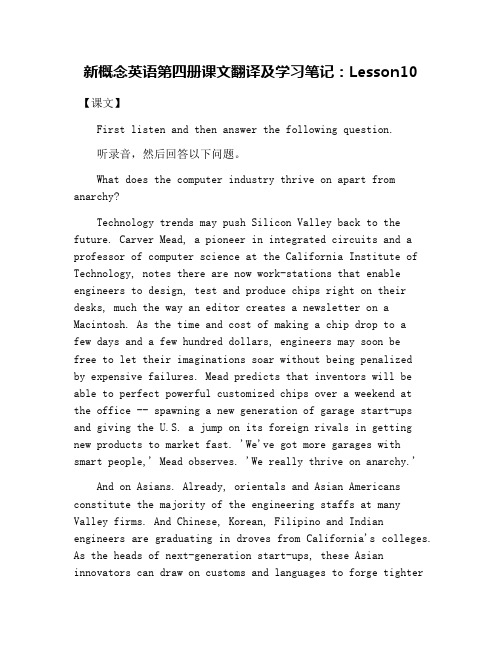
新概念英语第四册课文翻译及学习笔记:Lesson10【课文】First listen and then answer the following question.听录音,然后回答以下问题。
What does the computer industry thrive on apart from anarchy?Technology trends may push Silicon Valley back to the future. Carver Mead, a pioneer in integrated circuits and a professor of computer science at the California Institute of Technology, notes there are now work-stations that enable engineers to design, test and produce chips right on their desks, much the way an editor creates a newsletter on a Macintosh. As the time and cost of making a chip drop to afew days and a few hundred dollars, engineers may soon befree to let their imaginations soar without being penalizedby expensive failures. Mead predicts that inventors will be able to perfect powerful customized chips over a weekend atthe office -- spawning a new generation of garage start-ups and giving the U.S. a jump on its foreign rivals in getting new products to market fast. 'We've got more garages with smart people,' Mead observes. 'We really thrive on anarchy.'And on Asians. Already, orientals and Asian Americans constitute the majority of the engineering staffs at many Valley firms. And Chinese, Korean, Filipino and Indian engineers are graduating in droves from California's colleges. As the heads of next-generation start-ups, these Asian innovators can draw on customs and languages to forge tighterlinks with crucial Pacific Rim markets. For instance, Alex Au, a Stanford Ph.D. from Hong Kong, has set up a Taiwan factoryto challenge Japan's near lock on the memory-chip market.India-born N.Damodar Reddy's tiny California company reopened an AT & T chip plant in Kansas City last spring withfinancing from the state of Missouri. Before it becomes a retirement village, Silicon Valley may prove a classroom for building a global business.US NEWS AND WORLD REPORT, October 2, 1989【New words and expressions 生词和短语】silicon n. 硅integrated adj. 综合的circuit n. 线路,电路California n. 加利福尼亚(美国州名)workstation n. 工作站chip n. 芯片,集成电路片,集成块newsletter n. 时事通讯Macintosh n. 苹果机,一种个人电脑penalize v. 处罚,惩罚customize v. 按顾客具体需要制造spawn v. 引起,酿成thrive v. 兴旺,繁荣anarchy n. 无政府状态,混乱oriental n. 东方人constitute v. 构成drove n. 群innovator n. 发明者forge v. 发展memory-chip n. 内存条AT & T 美国电话电报公司 (American Telephone and Telegraph) Kansas n. 堪萨斯(美国州名)Missouri n. 密苏里(美国州名)【课文注释】1. thrive on靠……健壮发展,以……旺盛。
- 1、下载文档前请自行甄别文档内容的完整性,平台不提供额外的编辑、内容补充、找答案等附加服务。
- 2、"仅部分预览"的文档,不可在线预览部分如存在完整性等问题,可反馈申请退款(可完整预览的文档不适用该条件!)。
- 3、如文档侵犯您的权益,请联系客服反馈,我们会尽快为您处理(人工客服工作时间:9:00-18:30)。
I once sat in a hotel in Bloomsbury trying to have breakfast alone. A Russian with a habit of compulsively licking his lips asked if he could join me. I was afraid to say no; I thought it might be bad for détente. He explained to me that he was a linguist, and that he always liked to talk to Americans to see if he could make any connection between their speech and their ethnic background. When I told him about my mixed ancestry—my mother is Irish and Italian, my father a Lithuanian Jew—he began jumping up and down in his seat, rubbing his hands together, and licking his lips even more frantically.“Ah,” he said, “so you are really somebody who comes from what is called the boiling pot of America.” Yes, I told him, yes I was, but I quickly rose to leave. I thought it would be too hard to explain to him the relation of the boiling potters to the main course, and I wanted to get to the British Museum. I told him that the only thing I could think of that united people whose backgrounds, histories, and points of view were utterly diverse was that their people had landed at a place called Ellis Island.I didn't tell him that Ellis Island was the only American landmark I'd ever visited. How could I describe to him the estrangement I'd always felt from the kind of traveler who visits shrines to America's past greatness, those rebuilt forts with muskets behind glass and sabers mounted on the walls and gift shops selling maple sugar candy in the shape of Indian headdresses, those reconstructed villages with tables set for fifty and the Paul Revere silver gleaming?All that Americana—Plymouth Rock, Gettysburg, Mount Vernon, Valley Forge —it all inhabits for me a zone of blurred abstraction with far less hold on my imagination than the Bastille or Hampton Court. I suppose I've always known that my uninterest in it contains a large component of the willed: I am American, and those places purport to be my history. But they are not mine.Ellis Island is, though; it's the one place I can be sure my people are connected to. And so I made a journey there to find my history, like any Rotarian traveling in his Winnebago to Antietam to find his. I had become part of that humbling democracy of people looking in some site for a past that has grown unreal. The monument I traveled to was not, however, a tribute to some old glory. The minute I set foot upon the island I could feel all that it stood for: insecurity, obedience, anxiety, dehumanization, the terrified and careful deferenceof the displaced. I hadn't traveled to the Battery and boarded a ferry across from the Statue of Liberty to raise flags or breathe a richer, more triumphant air. I wanted to do homage to the ghosts.I felt them everywhere, from the moment I disembarked and saw the building with its high-minded brick, its hopeful little lawn, its ornamental cornices. The place was derelict when I arrived; it had not functioned for more than thirty years—almost as long as the time it had operated at full capacity as a major immigration center. I was surprised to learn what a small part of history Ellis Island had occupied. The main building was constructed in 1892, then rebuilt between 1898 and 1900 after a fire. Most of the immigrants who arrived during the latter half of the nineteenth century, mainly northern and western Europeans, landed not at Ellis Island but on the western tip of the Battery at Castle Garden, which had opened as a receiving center for immigrants in 1855.By the 1880s the facilities at Castle Garden had grown scandalously inadequate. Officials looked for an island on which to build a new immigration center because they thought that on an island immigrants could be more easily protected from swindlers andquickly transported to railroad terminals in New Jersey. Bedloe's Island was considered, but New Yorkers were aghast at the idea of a “Babel” ruining their beautiful new treasure, “Liberty Enlightening the World.” The statue's sculptor, Frederic Auguste Bartholdi, reacted to the prospect of immigrants landing near his masterpiece in horror; he called it a “monstrous plan.”So much for Emma Lazarus.Ellis Island was finally chosen because the citizens of New Jersey petitioned the federal government to remove from the island an old naval powder magazine that they thought dangerously close to the Jersey shore. The explosives were removed; no one wanted the island for anything. It was the perfect place to build an immigration center.I thought about the island's history as I walked into the building and made my way to the room that was the center in my imagination of the Ellis Island experience: the Great Hall. It had been made real for me in the stark, accusing photographs of Louis Hine and others who took those pictures to make a point. It was in the Great Hall that everyone had waited—waiting, always, the great vocation of the dispossessed. The room was empty, except for me and a handful of other visitors and the park ranger who showed us around. I felt myself grow insignificant in that room, with its huge semicircular windows, its air, even in dereliction, of solid and official probity.I walked in the deathlike expansiveness of the room's disuse and tried to think of what it might have been like, filled and swarming. More than sixteen million immigrants came through that room; approximately 250,000 were rejected. Not really a large proportion, but the implications for the rejected were dreadful. For some, there was nothing to go back to, or there was certain death; for others, who left as adventurers, to return would be to adopt in local memory the fool's role and the failure's. No wonder that the island's history includes reports of three thousand suicides.Sometimes immigrants could pass through Ellis Island in mere hours, though for some the process took days. The particulars of the experience in the Great Hall were often influenced by the political events and attitudes on the mainland. In the 1890s and the first years of the new century, when cheap labor was needed, the newly built receiving center took in its immigrants with comparatively little question. But as the century progressed, the economy worsened, eugenics became both scientifically respectable and popular, and World War I made American xenophobia seem rooted in fact.Immigration acts were passed; newcomers had to prove, besides moral correctness and financial solvency, their ability to read. Quota laws came into effect, limiting the number of immigrants from southern and eastern Europe to less than 14 percent of the total quota. Intelligence tests were biased against all non-English-speaking persons and medical examinations became increasingly strict, until the machinery of immigration nearly collapsed under its own weight. The Second Quota Law of 1924 provided that all immigrants be inspected and issued visas at American consular offices in Europe, rendering the center almost obsolete.On the day of my visit, my mind fastened upon the medical inspections, which had always seemed to me most emblematic of the ignominy and terror the immigrants endured. The medical inspectors, sometimes dressed in uniforms like soldiers, were particularly obsessed with a disease of the eyes called trachoma, which they checked for by flipping back the immigrants' top eyelids with a hook used for buttoning gloves—amethod that sometimes resulted in the transmission of the disease to healthy people. Mothers feared that if their children cried too much, their red eyes would be mistaken for a symptom of the disease and the whole family would be sent home. Those immigrants suspected of some physical disability had initials chalked on their coats. I remembered the photographs I'd seen of people standing, dumbstruck and innocent as cattle, with their manifest numbers hung around their necks and initials marked in chalk upon their coats: “E” for eye trouble, “K” for hernia, “L” for lameness, “X” for mental defects, “H” for heart disease.I thought of my grandparents as I stood in the room; my seventeen-year-old grandmother, coming alone from Ireland in 1896, vouched for by a stranger who had found her a place as a domestic servant to some Irish who had done well. I tried to imagine the assault it all must have been for her; I've been to her hometown, a collection of farms with a main street—smaller than the athletic field of my local public school. She must have watched the New York skyline as the first- and second-class passengers were whisked off the gangplank with the most cursory of inspections while she was made to board a ferry to the new immigration center.What could she have made of it—this buff-painted wooden structure with its towers and its blue slate roof, a place Harper's Weekly described as “a latter-day watering place hotel”? It would have been the first time she'd have heard people speaking some thing other than English. She would have mingled with people carrying baskets on their heads and eating foods unlike any she had ever seen—dark-eyed people, like the Sicilian she would marry ten years later, who came over with his family, responsible even then for his mother and sister. I don't know what they thought, my grandparents, for they were not expansive people, nor romantic; they didn't like to think of what they called “the hard times,” and their trip across the ocean was the single adventurous ac t of lives devoted after landing to security, respectability, and fitting in.What is the potency of Ellis Island for someone like me—an American, obviously, but one who has always felt that the country really belonged to the early settlers, that, as J. F. Powers wrote in “MorteD'Urban,” it had been “handed down to them by the Pilgrims, George Washington and others, and that they were taking a risk in letting you live in it.” I have never been the victim of overt discrimination; nothing I have wanted has be en denied me because of the accidents of blood. But I suppose it is part of being an American to be engaged in a somewhat tiresome but always self-absorbingprocess of national definition. And in this process, I have found in traveling to Ellis Island an important piece of evidence that could remind me I was right to feel my differentness. Something had happened to my people on that island, a result of the eternal wrongheadedness of American protectionism and the predictabilities of simple greed. I came to the island, too, so I could tell the ghosts that I was one of them, and that I honored them—their stoicism, and their innocence, the fear that turned them inward, and their pride. I wanted to tell them that I liked them better than the Americans who made them pass through the Great Hall and stole their names and chalked their weaknesses in public on their clothing. And to tell the ghosts what I have always thought: that American history was a very classy party that was not much fun until they arrived, brought the good food, turned up the music, and taught everyone to dance.一次我一个人坐在Bloomsbury的一家旅馆里吃早餐时,一个有着强制性舔嘴唇习惯的俄国人问是否能和我一起吃。
